| |
"To win any battle, you must fight as if you are already dead." |
| |
Swordsman, philosopher, writer and rōnin Miyamoto Musashi |
| |
"An eye for an eye will only make the whole world blind." |
| |
Mahatma Gandhi |
Despite co-authoring a string of bona fide classic films for director Kurosawa Akira, including one of the greatest of all samurai movies,** I get the feeling that screenwriter Hashimoto Shinobu was not convinced that the samurai code of Bushidō was as honourable as we have been led to believe. If it's evidence you're after, look no further than the screenplay he co-authored (with Takiguchi Yasuhiko) for the 1962 Harakiri [Seppuku], a brilliant but punishing work in which honour and decency is in short supply amongst the ranks of the lords and their samurai guards. And let's not forget that the most passionate speech in the Hashimoto co-scripted masterpiece Seven Samurai [Shichinin no samurai] (1954) has farmer's son Kikuchiyo rage against his samurai comrades for the havoc and destruction that their class has wreaked on the very farmers they are now defending. I've not seen director Okamoto Kihachi's 1965 Samurai, which Hashimoto co-wrote with Gunji Jiromasa and which apparently also calls the principles of Bushidō into question, but a year earlier he was the sole author of a screenplay for a film that plays almost like a sister work to Harakiri in its bitingly cynical view of the samurai code. Directed by Imai Tadashi, its Japanese title is Adauchi, which translates roughly either as 'Vengeance' or 'Vendetta', or as it is generally titled in the West, Revenge.
The film begins on a misty early July morning in 1722 Edo period Japan on a large group of workers who are busily constructing a large ring of bamboo fencing, a job that their foreman reminds them needs to be finished by noon. As they work, two passing merchants pause to wonder what is going on here, a question that is answered by a sign bearing an official notice of a vendetta to be settled by a duel between claimant Okuno Tatsunosuke and respondent Ezaki Shinpachi (Nakamura Kinnosuke), which is set to take place today in the public arena being hastily constructed for this purpose. As local sheriff Ogawa and his subordinate Jinza tour the arena and seek assurances from the foreman on the precision of its construction, they remark on the trivial matter that first triggered the feud that is soon to climax in a public duel to the death. Then, in a caption-free horizontal wipe, we're transported back in time to the trigger point in question, and trivial it does indeed prove to be.
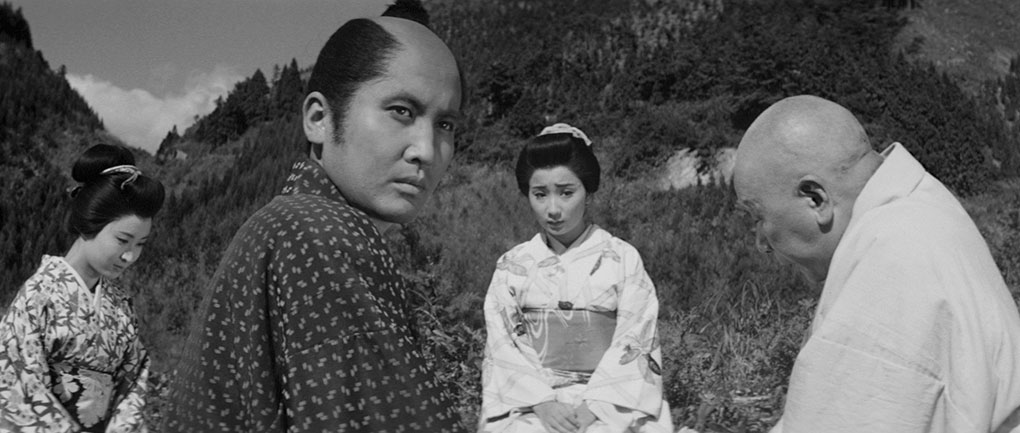
It began like this. When touring the castle grounds one day with Ogawa, high-ranking samurai Okuno Magodayu casually observes that the blade of one of the spears being serviced by the guards has lost its shine, and cheerfully suggests to his companion that there is no excuse for laziness on this score. His comments are immediately challenged by the aforementioned Ezaki Shinpachi, an untitled samurai whose house holds the official title of armourer and who, due to a tradition not elaborated on here, serves as a mounted guard on this day of every month. He points out that all that the spears need is a quick polish to restore their shine, then suggests that Magodayu was being needlessly harsh in his comments and demands that he be shown the respect that his station deserves. Magodayu takes instant offence at what he regards as lower rank insolence, and the two men defiantly double-down on their respective positions, which quickly escalates and is only prevented from exploding into violence by the forced restraint of others.
A short while later, Shinpachi's older brother, Jubei (also a mounted guard), finds a letter from Magodayu challenging Shinpachi to a duel by the Katsura River. He immediately runs to the riverside in search of his brother, only to discover him crouched by the water cleaning his sword, while the mortally wounded Magodayu lies immobile in the marsh nearby. As it is forbidden for members of noble families to kill each other in unsanctioned duels, Magodayu's uncle and family patriarch Niwa and the compliant Jubei cliam to Ogawa that the duel only came about because Shinpachi and Magodayu went insane, a deception that Jubei is less clearly than happy about pulling. Ogawa reports this to his superior, Minister Katagai, who initially favours exiling Shinpachi as a dangerous menace. After considering the stipend that each of these wealthy families currently pay into local government coffers, however – both of which could be lost if official action was taken against them – he decides to accept the insanity plea and orders both parties to await further instructions. On being told of the verdict, Shinpachi angrily protests to his brother that he is not insane, but Jubei insists the pretence is necessary to protect the future of Ezaki family, which has served this clan for seven generations. Magodayu's younger brother Shume (Tanba Tetsurō), meanwhile, demands that he be allowed to file an official request to take vengeance on his brother's killer. It's a move that his uncle firmly forbids, fearful that any accompanying investigation might lead to the ruination of the Okuno family if Magodayu is found to have been at fault.
An unspecified time later, Shinpachi has been exiled to a monastery to 'cure' him of a madness that he never had but which the isolated mountain living appears to now be driving him to. At first he seems happy enough with the monastery life, cheerfully teasing the heavy drinking Abbot about his fondness for deceased peasants' widows as they entertain two visitors, Shinpachi's sister Michi (Sasaki Ai) and his sweetheart Ritsu (Mita Yoshiko). When the Abbot suggests that he abandon his sword and run away with Ritsu, Sinpachi rejects the idea, convinced that he will be soon allowed to return home now that Shume has inherited his late brother's title. Yet despite his new position, when Shume overhears his fellow samurai suggesting that he values his title more than honour and his reputation as a swordsman, he responds by calmly informing them that he intends to take vengeance on Shinpachi in defiance of the law. "Ezaki Shinpachi is not sane," he tells them. "He is no different from a rabid dog. Nobody will complain if I put him out of his misery."
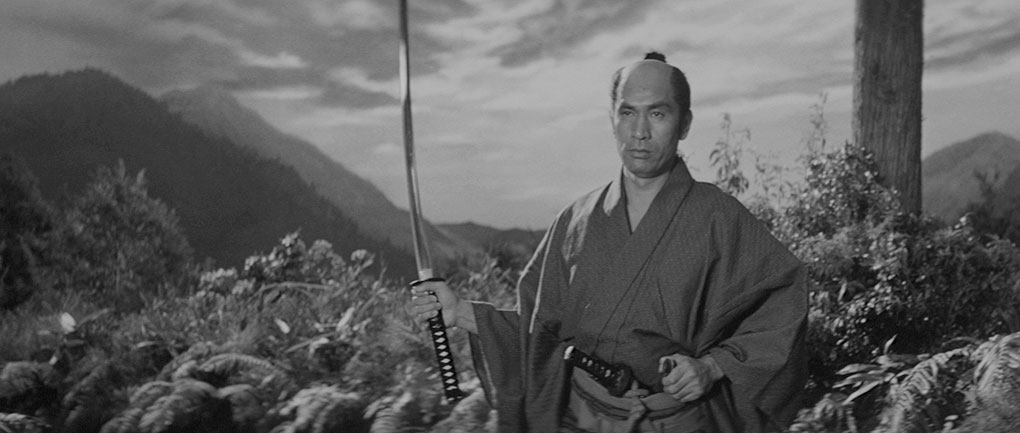
If I'm going to avoid giving away later plot developments I should probably stop there, but any discussion about the meat of the film's subtextual dismantling of samurai code is going to take us into serious spoiler territory, so please either proceed cautiously with that in mind or hop to the final paragraph to avoid it (click here to do so automatically). That said, those paying close attention will recall that the public duel that this is all building up to has Shinpachi pitted not against the dangerously skilled Shume, but his far less experienced young brother Tatsunosuke. And as the time for the fight nears, it's clearly one that both men are dreading, Tatsunosuke because his youth and lack of combat experience put him at a serious disadvantage, Shinpachi because he has given into pressure from his mother to die like a samurai, and is resigned to allowing Tatsunosuke to take his life. But their reasons run deeper than the stomach-churching fear of two gladiators about to face possible violent death in a public arena. In what may be the film's most economic and beautifully timed reveal (if you're new to the film, it's not too late to skip ahead), we learn – 47 minutes in and in just two minutes of screen time – that Tatsunosuke and Shinpachi were once good friends. In this moment it becomes abundantly clear why Tatsunosuke is mortified at the prospect of having to kill the man who trained him in horsemanship and whose company he once enjoyed, and why Shinpachi is shown furiously blunting the edge of his sword to avoid inadvertently injuring the boy.
It's a very different story for sheriff Ogawa, who beams at the chance to financially benefit from this conflict, or for the nearby townspeople, who turn up in droves to enjoy the spectacle of watching two samurai battle to the death. Also profiteering from the event are a range of merchants who set up stalls to sell their wares to excited onlookers, and the Edo equivalent of yobbish ticket touts, who demand a high fee from the visiting Abbot for a ringside seat, then push him violently to the ground when he attempts to ignore them and walk past regardless. There's a whiff of the shameless exploitation of Billy Wilder's 1951 Ace in the Hole to this ghoulish carnival, while the notion of a series of duels escalating from a trivial exchange has its roots in Joseph Conrad's 1908 serial, The Duel: A Military Story, which was adapted for the screen in 1977 as The Duellists by screenwriter Gerald Vaughan-Hughes and first-time feature director Ridley Scott. Here, the very notion of honour is turned on its head to become an essentially meaningless excuse for vengeance driven solely by wounded pride. In the first duel, Magodayu loses his life because his sense of self-importance prevents him from shrugging off a retort from a man he regards as his social inferior, while his brother is then goaded to a similar fate by the mocking gossip of his fellow clansmen. The final public duel is one that neither of the two combatants want to be part of, both having been pressured into participating by their family and peers. Innocence and goodness are in short supply here, and are almost solely embodied by the young Tatsunosuke, an obedient but reluctant pawn in a deadly game in which he has only an associative stake. This becomes particularly evident at the very end of the film's climactic scene, and while I'm not about to reveal what happens to the lad, the moment in question delivers an emotional blow as cutting as any inflicted by the swords of others.
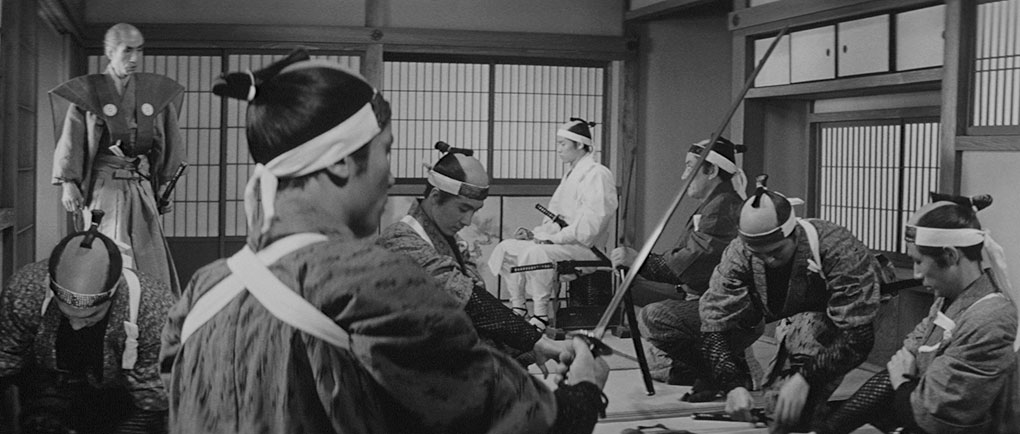
The most fascinating character here is definitely Shinpachi, in part because our perception of him shifts repeatedly over the course of the story. Initially, he seems absolutely in the right, standing up to Magodayu less because his own pride is wounded but because Magodayu's comments are a slur on the integrity of his comrades. His defiance when expected by his brother to accept being tarred as a madman is understandable, and his upbeat joshing with the Abbot while at the monastery reveals a likeable side to the man that suggests that he may have lead a happy life had he not become embroiled in this petty but ultimately lethal conflict. Our engagement with him is complicated by his growing mental instability, and when he attempts to get the drop on the highly skilled Shume, his terrified scuttling around and desperate sword swings made me retrospectively wonder what part luck played in his earlier duel with Magodayu, one that we crucially did not get to see. His failure to respond in kind to Ritsu's non-judgemental affection made me want to slap some sense into him, and what empathy I had left all but dissolved when, on learning that his endless dithering has resulted in her being betrothed to another, he claims not to be jealous, then violently contradicts this by pushing her into a barn and raping her. Afterwards, the two sit with their backs to each other, Shinpachi seemingly ashamed of his actions, while Ritsu almost seems relieved that he has finally revealed his true feelings for her, however forcefully and unpleasantly. She even suggests that she secure her father's permission for the two to marry and run away together, an arrangement she feels sure that her father will agree to. In an emotionally brutal edit, the film then cuts straight to her father furiously refusing his daughter's request. That he is the foreman who will later be charged with overseeing the construction of the arena fence, and who will drunkenly and defiantly insult Ogawa after the duel has concluded, could probably be the basis for a small essay of its own.
What sympathy I lost for Shinpachi for his treatment of Ritsu comes thundering back with interest as the climactic duel approaches and we are shown how the odds are being crookedly stacked against him. Tatsunosuke is fitted with a layer of light chain mail beneath his clothing to offer some protection from Shinpachi's sword, and a party of six skilled and armoured samurai have been engaged to act as seconds and ordered to surround Shinpachi and relentlessly attack him until he can no longer stand, allowing Tatsunosuke to step in and deliver the killing blow. Couple this with the knowledge that Shinpachi has blunted his sword and had intended to simply let his former friend take his life, and his walk to the arena has all the pit-of-stomach dread of a wrongly accused man being led to the electric chair, made worse by a yobbish crowd that shouts insults and throws objects at him as he enters the arena. By this point, just about everyone except Tatsunosuke has been shown acting selfishly and dishonourably, whether it be Jubei putting the name of the family before the life of his brother, or Ogawa's corrupt gaming of the conflict for his own gain. And don't get me started on the Okuno family – when the uncle stands before the samurai engaged to protect Tatsunosuke and barks out instructions that detail how Shinpachi is to be taken down, I actually caught myself whispering, "you absolute bastards!" at the screen. All notions of Bushidō honour and integrity are completely discarded in the chaotic but brilliantly directed final duel, where the inevitable collides violently with the unpredictable to genuinely startling effect. It's an extraordinary scene whose content it would be unfair of me to reveal, despite the above spoiler warning, but it's as breathless an example of immaculately choreographed chaos as I've seen on screen since the similarly toned climax of Harakiri.
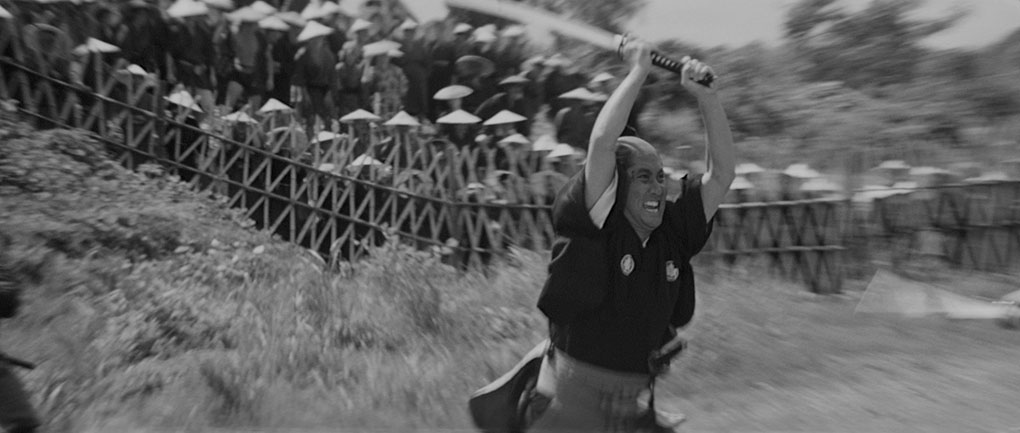
I have to admit to being new to the cinema of director Imai Tadashi, which I learned from the contributors to the special features on this disc has long been held in seriously high regard in Imai's native Japan. Adauchi is an absolute mother of an introduction, an immaculately crafted work that makes emotive and richly cinematic use of close-ups, camera movement, editing, sound effects, and the scope aspect ratio, particularly in the blocking of multiple characters within the frame. It tells a gut-punch of a story in riveting and smartly structured fashion, skipping between timelines and even embedding flashbacks within flashbacks without ever becoming confusing. Over the course of the story, it tears the samurai code into blood-stained pieces, and certainly takes a dim view of a world in which just about everyone seems to be at motivated primarily by self-interest and misplaced notions of pride. What really hits home is how little seems to have changed in the decades since Imai and Hashimoto made what was clearly also intended as a commentary on contemporary Japan, and how international its subtextual messaging remains. Duels to the death may no longer be part of any civilised culture, but the film's unblinking suggestion that wealthy titled families will cheat the system to get what they want with the willing assistance of corrupt politicians, regardless of the sometimes devastating impact on others, can't help but have a incisively modern ring.
The result of a 2K restoration from the original film elements, the 1080p 2.35:1 transfer on Eureka's Blu-ray is absolutely first-rate. Picture detail is clearly defined, and while facial close-ups and mid-shots tend to shine the brightest here, the backgrounds of exterior shots in which characters are foregrounded, particularly those in the sunlit arena, have also polished up handsomely. The contrast balance is excellent, and while the solid black levels do grey out slightly during the misty opening scene, in darker interiors, and in the night-time exterior sequence when the mortally wounded Magodayu is surreptitiously transported to his home, this helps retain shadow detail that would otherwise be lost and feels absolutely right for the scenes in question. The picture is also clear of dust, dirt and damage, and the image sits solidly in frame with no trace of jitter or other errant movement. A fine film grain is visible throughout.
The original Japanese soundtrack is presented in Linear PCM 2.0 mono and is also in fine shape. The tonal range restrictions inevitable for a film of this vintage are present, but otherwise the dialogue, sound effects (including, in one scene, a captivatingly expressionistic use of wind), and Mayuzumi Toshirō's impressive score are all clearly reproduced. There are no obvious signs of any former wear, and no background hiss or crackle when silence falls.
Optional English subtitles are activated by default.
Tony Rayns on Revenge (22:05)
Rightly revered expert on Asian cinema, Tony Rayns, examines the film and the careers of director Imai Tadashi, screenwriter Hashimoto Shinobu, lead actor Nakamura Kinnosuke, and score composer Mayuzumi Toshirō. He explains how the film is an atypical work for the Toei studio and why it was greenlighted, links its themes to the views of a more rebellious generation in the 1960s, and praises its underlying realism and attention to period detail. There's plenty more of interest here.
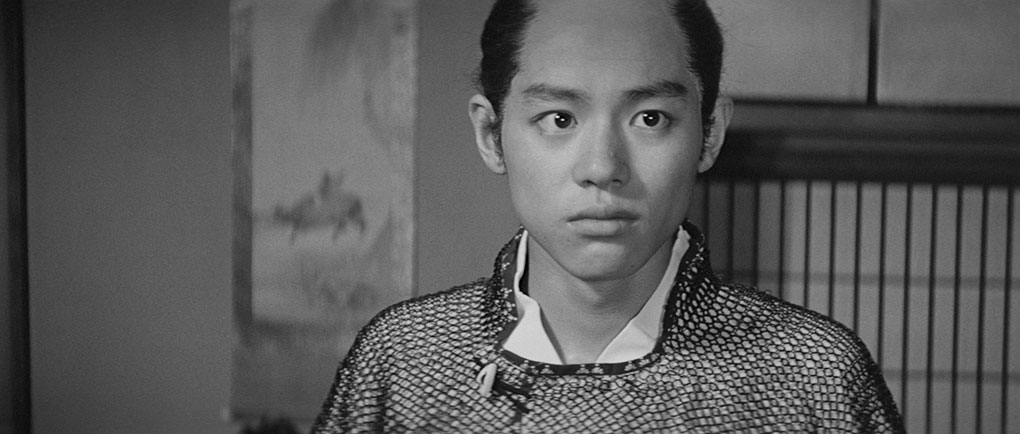
The Enemy Within: Power and Politics in the Films of Imai Tadashi (15:59)
Writer, film curator and Midnight Eye website co-founder, Jasper Sharp, provides a welcome overview of the career of Adauchi director Imai Tadashi, highlighting key works from his filmography, clips from which have been handily included. He looks at why Imai's films are less widely known outside of Japan than his contemporary, Kurosawa Akira, despite being as highly praised on home soil and having twice having topped Kinema Junpo magazine's picks for best films of the year. As a newcomer to Imai's work, I found this fascinating.
Also included is a 20-page Booklet, the bulk of which is given over to an essay by writer, Japanese cinema specialist and Midnight Eye co-founder, Tom Mes. Instead of focussing specifically on the film, he usefully helps to contextualise its story by outlining some key Japanese history, as well as examining how director Imai, screenwriter Hashimoto and their contemporaries used period films to criticise Bushidō and comment on contemporary socio-political issues. Credits for the film, notes on correct screen setup and promotional imagery have also been included.
I was late getting to this disc, in part because I wanted to watch it with my partner in the hope of getting a little insight into aspects of the story that would have otherwise passed me by, but in the end her primary contribution was to cheerfully sing along with the battle tune that Shinpachi belts out as he bathes before heading back to face Tatsunosuke. It mattered little, as all I needed to know was supplied either by the film itself and the special features on this disc, which although small in number proved hugely informative. I went in unprepared and was genuinely blown away by Adauchi, a superbly told and compellingly performed dismantling of Bushidō that also resonates as a grimly relevant cry against the corruption of the rich and powerful and the politicians they have tucked firmly in their pockets. As suggested above, this would make a punishingly perfect double-bill with the Hashimoto co-scripted Harakiri, which is also still available on Eureka Masters of Cinema Blu-ray. A superb work on an excellent disc. Highly recommended.
The Japanese convention of surname first has been used for Japanese names throughout this review.
|